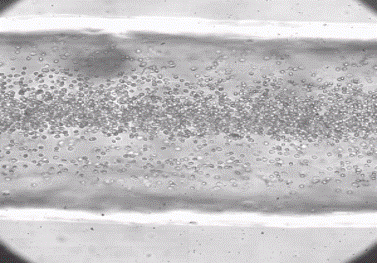SAMPAD LAHA
Prime Minister's Research Fellow
PhD Research Scholar,
Department of Mechanical Engineering,
Indian Institute of Technology, Kharagpur,
West Bengal, India.
Doctoral Supervisor :
Prof. Suman Chakraborty
Professor, Department of Mechanical Engineering,
Indian Institute of Technology, Kharagpur,
Email: suman@mech.iitkgp.ac.in



My Research Interests
I am Sampad, currently a PMRF PhD research scholar from the Department of Mechanical Engineering, IIT Kharagpur, actively working in the domain of organ-on-a-chip research and point-of-care diagnostics.
Organ-on-a-chip devices are cutting-edge microfluidic platforms lined with living human cells for in-vitro replication of the organ functionality with regards to drug testing, disease modelling and related diagnostics. Organ-on-chips offer a wonderful fusion between fundamental and applied research. Most of the organ-on-chip devices involve flow of body fluids and/or air, hence they offer an opportunity of multi-phase fluid dynamic investigations at microscale to unravel different complex physiological processes. At the same time, these microfluidic platforms may be utilized effectively in the applied diagnostic domain for investigating disease progression, drug toxicology and for testing of new medicines and vaccines. The main motivation behind my work is to popularize the concept and use of organ-on-chip technology in our country. Since uniform infrastructural facilities are not available country wide, I aim to develop some low-cost simple fabrication protocols which will enable manufacturing of these devices even in low-facility laboratories. At the same time, it is important to ensure that the devices should be adequately mimicking the cellular micro-environment and human in-vivo physiology, in order to provide accurate predictions. The subsequent objective is to utilize these bio-engineered platforms for modelling some of the complex in-vivo flow processes like hemodynamics. Currently we are investigating the flow characteristics of red blood cells through biomimetic microfluidic channels with an aim of characterizing the in-vitro cell free layer formed within the channels .(refer to Research page for more details).
I also have a keen interest in working with paper-based and cloth-based microfluidic platforms for affordable point-of-care diagnostics. My topic of interest in this domain is related to the mechanism of complex biofluid transport ( blood, plasma, etc.) through paper-based platforms. Of late, we have published our findings on the spreading dynamics of blood through porous media( JCIS, 2023, 640, 309-319, ; ACS Sens. 2022, 7, 7, 2028–2036), highlighting the effect of cellular aggregation and limited sample volume.


Fabrication of Vasculature-mimicking micro-channels

Bright field image of RBC flow through fabricated microchannel

Analysis of fingering instability of blood on wet paper (ACS Sens. 2022, 7, 7, 2028–2036)

Cellular aggregation within paper pores (JCIS, 2023, 640, 309-319)
